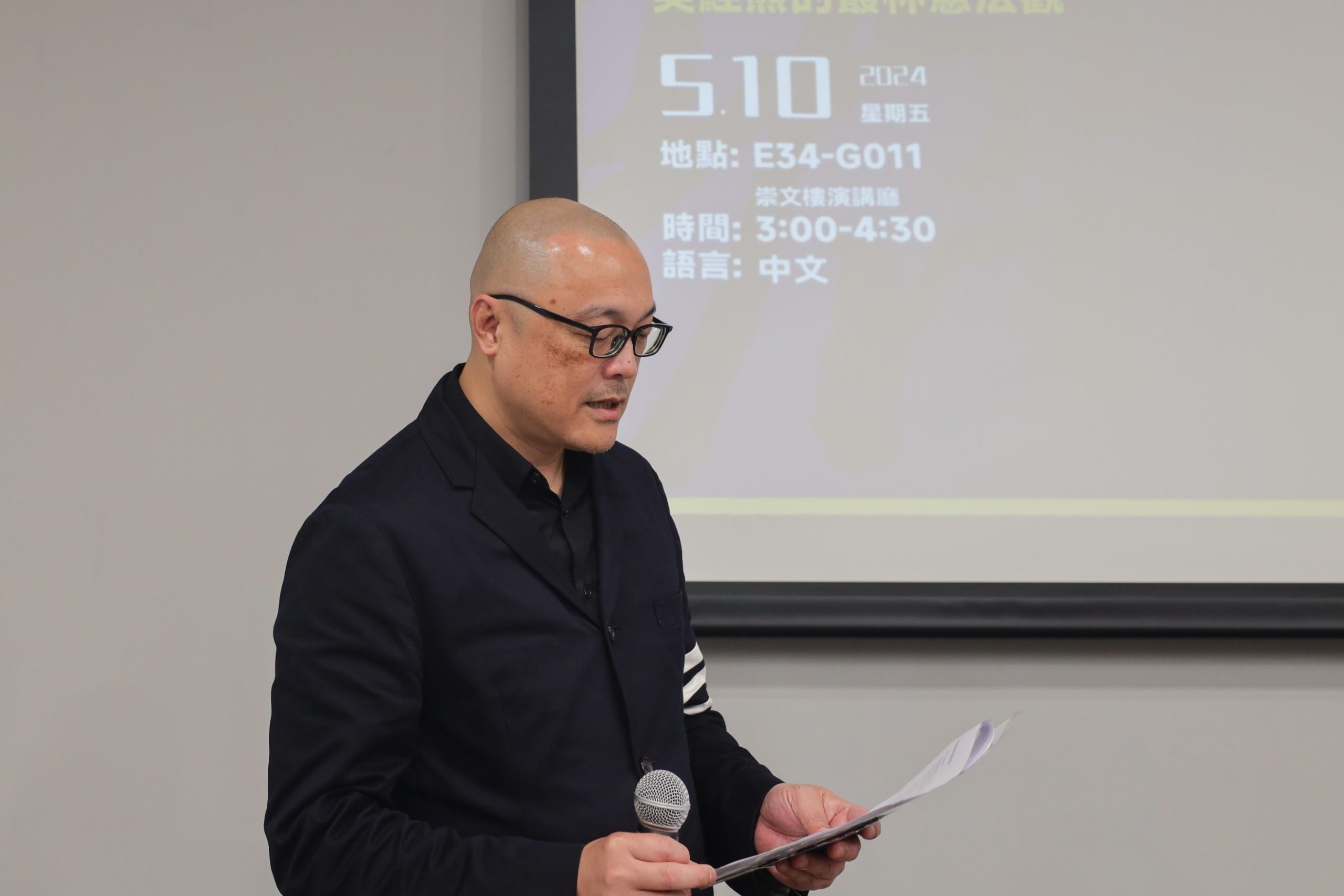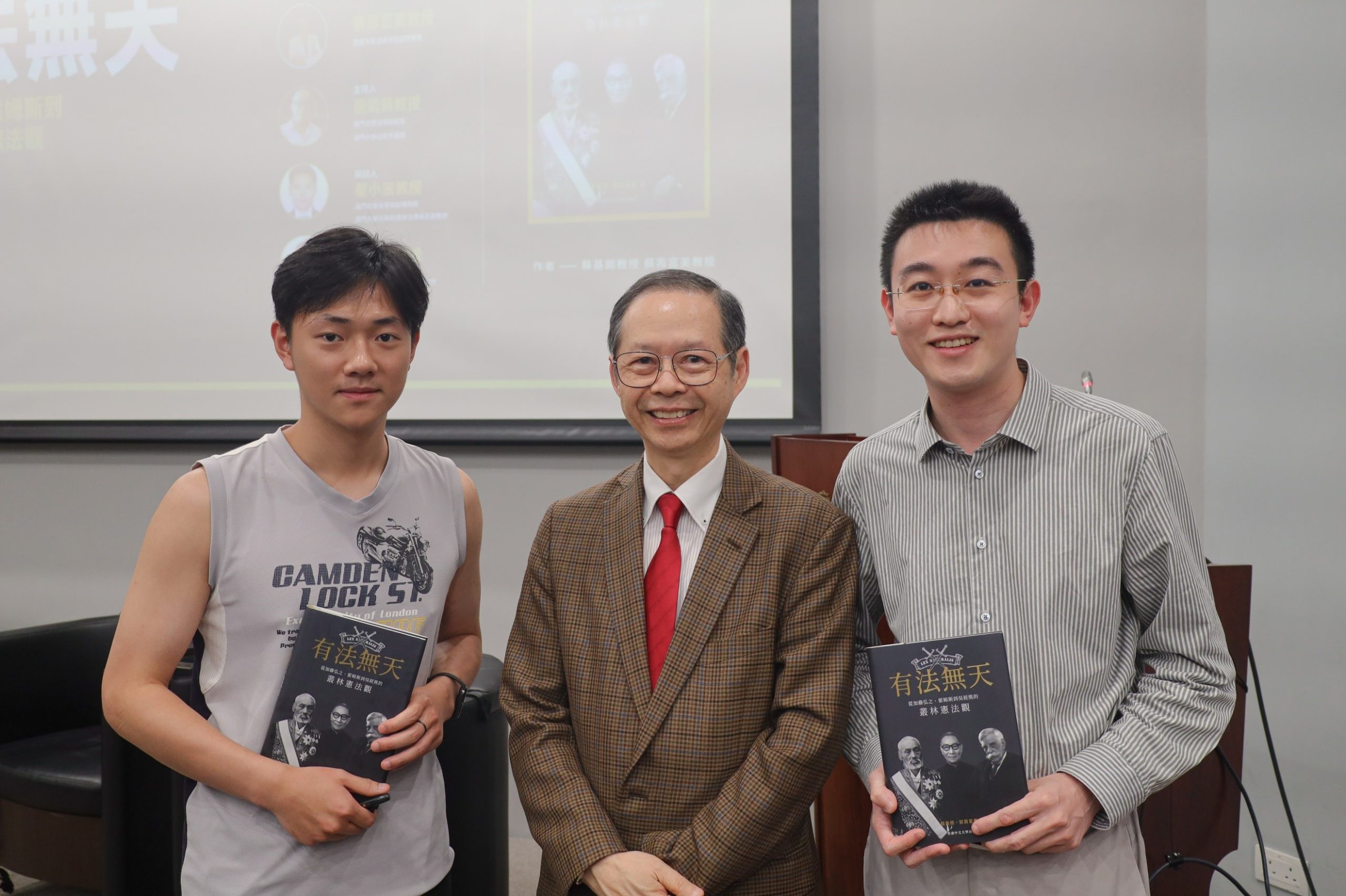【IAS】 IAS Lecture on Frontiers in Humanities: “Law Without Heaven: Darwinian Constitutionalism from Katō Hiroyuki and Justice Oliver Holmes to John C. H. Wu” was successfully conducted
【高研院】高研院崇文講座:《有法無天 - 從加藤弘之、霍姆斯到吳經熊的叢林憲法觀》圓滿舉行

由高研院主辦的崇文講座之《有法無天-從加藤弘之、霍姆斯到吳經熊的叢林憲法觀》書本分享會於5月10日在E34崇文樓演講廳圓滿舉行。本次講座由香港大學香港人文社會研究所院士、香港大學法律學院訪問學者蘇基朗教授作為主講人;澳門大學法學院院長、法學院教授——唐曉晴教授作為主持人;以及澳門大學法學院助理院長、法學院副教授——翟小波教授,澳門大學高研院院長、法學院講座教授——於興中教授作為與談人。
《有法無天》一書由蘇基朗教授與蘇壽富美教授合著,深刻地探討了社會、法律以及人性的真諦:這些概念深深地影響著人類。在征服欲與優越感的碰撞中平衡尊重與同情,不僅是社會達爾文主義與人文主義的較量,更是塑造人類社會的關鍵。蘇教授強調了社會達爾文主義的危害,如優生學、法西斯思想等,這些思想對人類社會產生了深遠的負面影響。
隨後,蘇教授進一步借鑒三位憲法學家——加藤弘之、霍姆斯、吳經熊的思想,探討了當時的法學家如何平衡天,法,社會之間的關係,找到自己的平衡。加藤弘之將天的概念與天皇的恩賜聯繫起來,這與當時日本社會的歷史背景緊密相連。他認為科學與倫理無關,從而否定了天賦人權,但同時,他又堅信天皇的神聖性,這種矛盾體現了日本特有的「西學為用,日本思想為主」的思想模式。霍姆斯的觀點則更為直接,他認為法律與社會權力結構直接相關,社會權力決定了一切,不存在所謂的天賦人權;人權完全是社會權力所決定的,法律的本質不在於邏輯,而在於經驗的積累。吳經熊作為叢林憲法學家,同樣有他矛盾的一面:他對中國傳統法律推崇備至,認為中國是最早提出公平正義的國家,然而對於傳統文化卻不甚欣賞,對孔子亦有諸多批評。他對霍姆斯的思想亦極為推崇,渴望將其理念推廣引入到中國。
在討論環節,諸位教授分享了無數精闢見解,對《有法無天》一書進行了深入點評。本次講座吸引了來自不同領域的師生參加,現場討論氛圍濃烈。高研院未來將持續跟進最新的研究趨勢,舉辦更多高品質學術活動,以促進知識的交流和思想的碰撞。
The 2024 IAS Lecture on Frontiers in Humanities – a book sharing entitled “Law Without Heaven: Darwinian Constitutionalism from Katō Hiroyuki and Justice Oliver Holmes to John C. H. Wu,” was successfully held by the Institute of Advanced Studies in Humanities and Social Sciences (IAS) on May 10th. Professor Billy Kee Long So, a fellow of Hong Kong Institute for the Humanities and Social Sciences and a visiting fellow of HKU Law School, was invited to deliver the lecture. Professor Io Cheng Tong, Dean of the Faculty of Law (FLL), was invited to be the moderator. Professor Xiaobo Zhai, Assistant Dean and Associate Professor of the Faculty of Law (FLL), and Professor Xingzhong Yu, Dean of IAS and Chair Professor of FLL, were invited to serve as discussants.
Law Without Heaven, a book co-authored by Prof. K.L. So and Prof. Sufumi So, takes a profound look at what law, society and human nature is: concepts that deeply shapes the humanity. Balancing respect and empathy in the clash between the desire for conquest and superiority, is not only a conflict between Social Darwinism and humanism but also the key to reshape human society. Prof. So highlighted the dangers of Social Darwinism, such as eugenics and fascism, which have had far-reaching negative impacts on human society.
Prof. So then drew further on the ideas of three constitutional law scholars – Hiroyuki Kato, Holmes, and Wu Jingxiong – to explore how the jurists of the time balanced the relationship between heaven, law, and society to find their own equilibrium. Hiroyuki Kato linked the concept of heaven to the gift of the Emperor, which was closely related to the historical background of Japanese society at that time. He believed that science had nothing to do with ethics, thus denying the gift of human rights, but at the same time, he firmly believed in the sanctity of the Emperor, a contradiction that embodies Japan’s unique mode of thought of “Western learning for the use, and Japanese thought for the main purpose”. Holmes’s view is more direct. He believes that law is directly related to the structure of social power, which determines everything, and that there is no such thing as natural human rights; human rights are entirely determined by social power, and the nature of law does not lie in logic, but in the accumulation of experience. John C. H., Wu, as a representative of Jungle Constitutionalism, also has his contradictory side: he has a great respect for the traditional Chinese law, believing that China is the first to put forward the concept of fairness and justice. But he has not very much appreciation of the traditional culture, and he also had a lot of criticism towards Confucianism. He is a great admirer of Holmes’s ideas and is eager to promote them in China.
During the discussion, the professors shared numerous insightful comments and analysis the book from multiple perspectives, including jurisprudence and legal history studies. The lecture attracted students and faculties from different fields to participate, fostering a robust atmosphere of academic discourse. IAS will continue to follow the latest research trends, and organize more high-quality academic activities to promote the exchange of knowledge and the collision of ideas in the future.






